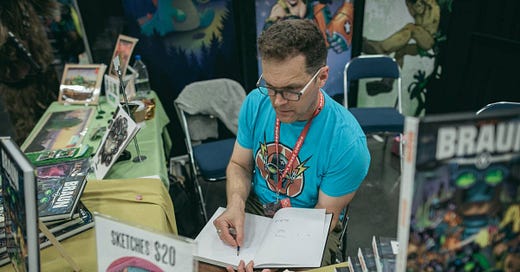Surprising as it may be, as an artist, I think there's a very good chance that 80-90% of you will eventually do some form of freelance or contract work in your career. But there are a variety of factors that may determine whether that's a long-term plan or simply a side-hustle. Having a taste of that kind of freedom comes with its rewards and risks. When starting out, getting that FIRST JOB can be daunting and difficult. With a job comes the perks: Health Insurance, Paid Vacation, Sick Leave, Regular Paycheck, a 401k Retirement Fund and perhaps even Bonuses. Of course there are a lot of other ancillary perks as well but generally these are typically the main ones.
With working as a STUDIO PROFESSIONAL you also have the support system of an IT person to help you with your computer issues, a front desk admin or HR person to help with other items, like office supplies and internal career path help. But mainly you get the opportunity for mentorship and guidance from peers and colleagues. Your skills are pushed to new heights and you can contrast and compare how others solve similar problems.
This is why it's probably a really good idea when you're starting out in your career to find that studio job. Not only will you gain the confidence and exponentially grow your skills, you'll also get a better understanding about the core principals of an industry. By staying hungry and learning about, not only every aspect of your job but for everyone up and down the chain from your job you'll be in a better position to freelance with confidence later.
Starting out as a FREELANCER is a considerably harder path, but not impossible. It just depends how much harder you want to work, how DIY you are about being your own IT person, your own admin and how active you are in learning on your own. In many cases, freelancers are very disciplined people. The terms self-starter comes to mine, lone wolf, rogue agent or whatever other sexy title you want to give it. It also means, if you decide at some point to apply for a studio job, that the HR person reviewing your resume may see: SOMEONE WHO DOESN'T PLAY WELL WITH OTHERS. This may or may not be true. To combat this sort of typecasting it may be helpful to find ways to get involved with your local art community through community-based projects, teaching and mentorship programs of your own.
But what if, for instance you're fine with freelancing early on or at some point in your career. What does that picture look like? Reality has a way of sobering one's view of the future. Are you going to be as likely to get hired as a 50 year-old Texture Artist?
By the time you're in your mid-30s and 40s people are expecting creatives to take on LEAD, MANAGEMENT, or DIRECTOR roles. For companies to stay FRESH and CURRENT they are constantly looking toward developing younger talent. LEGALLY that's not what they're saying but these are the facts. Older talent have deep understanding of skills and the working mechanisms of an org and hence, are more valuable to a company in leadership roles. But at some point, one may tire of this kind of grind and miss being creative. Enter the Freelance Dragon!
Having worked in a variety of studio environments will hopefully have gained you some contacts over the years...yet another perk of being a studio creative, at least for a little while. Heading out on your own can be scary no matter where you're at in your career. Early on...you don't have a lot of experience or contacts, later on you have a mortgage perhaps, a family and kids who want and need things. The stress is real in both situations, but like anything difficult you find ways to break things down into manageable components.
Personally, it took me awhile to realize that I prefer Freelance over a Studio environment. I work hard in both modes but I rarely felt as rewarded for my output as I do with Freelance. I work, less, make more money and have a lot more free time to enjoy life. I don't feel plugged into a system that is constantly judging my performance or pushing me toward a management position. I get to jump front one project to another, and the variety is hard to beat. As a freelancer I can utilize more of my skills than I ever could as a studio hire. Of course it has dry spells, and I have to trouble-shoot my computer problems with outside sources. I have to keep extensive track of my hours, receipts and billing but that small responsibility, at least to me, outweighs the cost. By not commuting anywhere I easily save two hours a day I can use for exercise and personal development.
By keeping all this in mind, a freelancer can continue to work far longer in their career doing the work they love. It doesn't necessarily get any easier, in fact, there are times when your clients are easily half your age and you have to find common ground. But as long as you can offer, SPEED, QUALITY and a FAIR PRICE, most clients don't mind who are where you are. As you plan your career path, give everything a try. Take note at what worked and what didn't, where you thrived and where you plateaued. The results may surprise you.
=s=





